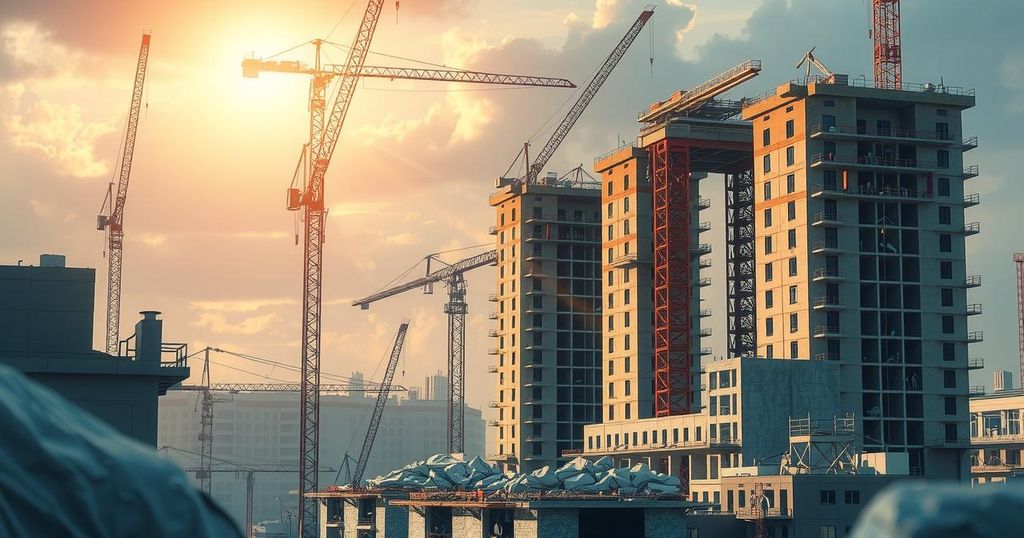Egypt has proposed a $53 billion reconstruction plan for Gaza, presented at an Arab League summit as an alternative to Trump’s controversial plan promoting Palestinian relocation. The initiative aims to provide emergency relief and long-term economic development but faces challenges including governance issues and lack of Israeli support. The proposal acknowledges Hamas’s influence while aiming to restore Palestinian rights through a political process, seeking support from Arab nations and the UN for its successful implementation.
Egypt has unveiled a $53 billion plan aimed at rebuilding Gaza, offering an alternative to former President Donald Trump’s controversial proposal, which many criticized as promoting ethnic cleansing through population relocation. The initiative was introduced at an Arab League summit in Cairo, emphasizing emergency relief, rebuilding infrastructure, and fostering long-term economic growth. President Abdel Fattah al-Sisi asserted that this strategy would allow Palestinians to remain on their land, garnering the support of United Nations Secretary-General António Guterres, who pledged full cooperation from the UN.
The Egyptian government provided a comprehensive 112-page document, featuring AI-generated visualizations of proposed housing projects, community centers, and developments such as a commercial harbor and a technology hub. However, the plan lacks clarity regarding governance in Gaza, only vaguely referencing a Palestinian administrative committee. Moreover, it has yet to receive Israel’s endorsement; Prime Minister Benjamin Netanyahu seeks sustained control over Palestinian territories, indicating potential obstacles to realization.
Despite ongoing conflict and devastation in Gaza, Hamas remains a critical political actor, expressing resistance to any imposed reconstruction projects that exclude its involvement. Senior Hamas official Sami Abu Zuhri emphasized the group’s commitment to the Palestinian cause, insisting on self-governance free from foreign intervention and denouncing displacement efforts. Hamas additionally called upon the Arab League to actively prevent the forced relocation of Palestinians from Gaza.
While the Egyptian plan recognizes the influence of armed factions in Gaza, it proposes that these issues are solvable through a credible political process that restores Palestinian rights. The Egyptian administration, along with several Arab states, condemns Israeli violence while regarding Hamas as a security threat and has traditionally aligned with Israel’s blockade policies.
Palestinian Authority President Mahmoud Abbas, whose influence in Gaza is limited, attended the summit. The resurgence of Arab initiatives following Trump’s proposed plans is seen as crucial to avoid further destabilization in the region amid fears of forced Palestinian relocation. UN Secretary-General Guterres endorsed the Arab-led effort, viewing it as vital for Gaza’s reconstruction and emphasizing the urgent need for a ceasefire agreement to sustain stability in the area.
Egypt’s reconstruction proposal divides into two phases: an initial recovery stage over six months focusing on rehabilitating the immediate needs of displaced individuals and an extended reconstruction phase lasting four and a half years dedicated to building housing and critical infrastructure. Funding for this ambitious plan is expected to rely on investments from wealthy Gulf nations, including the UAE, Qatar, and Saudi Arabia.
In summary, Egypt’s $53 billion reconstruction plan for Gaza seeks to provide a viable alternative to Trump’s criticized proposition. While emphasizing Palestinian self-determination and infrastructure rebuilding, its success hinges on regional cooperation and support, particularly in navigating the complexities of governance and security involving Hamas. The international community, led by the UN, plays a pivotal role in facilitating this initiative and ensuring sustained peace in the region.
Original Source: www.theguardian.com




